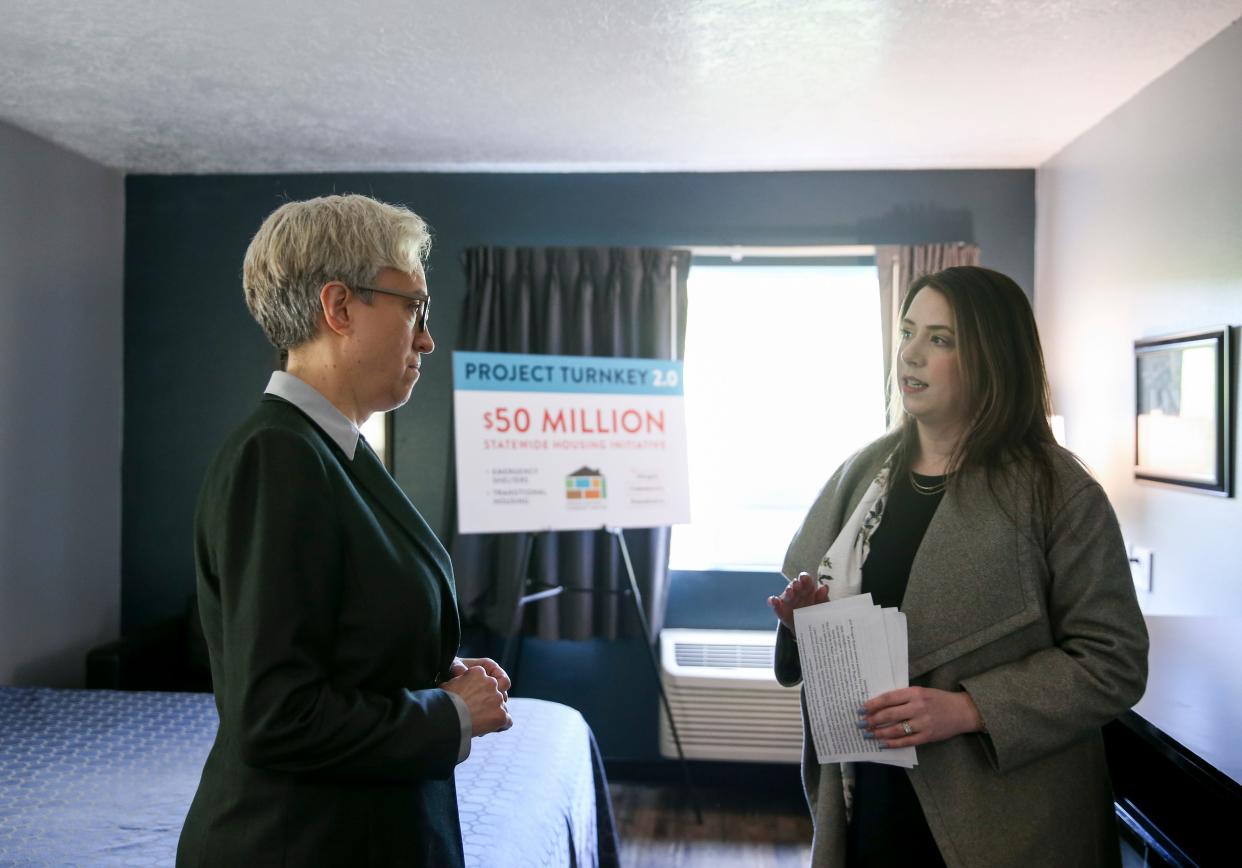Gov. Tina Kotek marks 100 days in office, urges millions more towards priorities

- Oops!Something went wrong.Please try again later.
Gov. Tina Kotek addressed the public Wednesday to discuss her first 100-day "sprint" in office — and make it clear she is not satisfied with the Legislature's initial suggestion for the next biennial budget.
She said the "frank conversations" she has had during her first days in office included those surrounding a lack of resources such as money, workers and support.
"But in my first 100 days as your governor, I have seen something else: potential," she said.
Kotek reaffirmed the priorities she laid out on her first day as governor and during her inauguration: housing and homelessness, education and behavioral health.
She thanked legislators for laying the foundation to "improve the lives of all Oregonians" by approving the $200 million housing and homelessness package aimed at keeping thousands of Oregonians from becoming homeless and adding 600 shelter beds across the state.
But Kotek warned she is not wavering in her call for legislators to approve a budget that would divert savings typically set aside for the state's rainy day fund to use towards those "priority areas."
That includes a push by her for even more funding for homelessness.
'Status quo budget' unacceptable, Kotek warns
Kotek's comments on the budget reflect the start of what could be a contentious budget fight over the next several months.
The proposed budget framework lawmakers announced in March called for state agencies to cut spending by 2.5% and focus on maintaining existing services as one-time federal relief funding tapers off.
"A status quo budget — or worse, a cuts budget — is completely unacceptable for the next two years ahead of us," Kotek said.
Reserve funds currently sit at $2 billion. It's a cushion Kotek said she is "confident" would allow for the $765 million diversion she is suggesting.
"Investing in solutions now will yield far better results in the long term than padding our savings accounts while Oregon communities are struggling," she said. "Our problems will only become more expensive to address if neglected."
In a meeting with reporters later in the afternoon, Sen. Elizabeth Steiner, D-Portland, reiterated her tendency to be "pretty fiscally conservative." Steiner said she is not saying no to diverting rainy-day funds, but is also not saying she's eager to do it.
She and her Ways and Means co-chair Rep. Tawna Sanchez, D-Portland, operated from the assumption that it is easier to add than take away when designing the proposed framework, she said.
The economy is "long overdue" for an economic downturn, Steiner said, describing when Beaverton School District saw classroom sizes balloon in 2012 after spending down their reserves. The district cut at least 344 positions, including all teacher librarians, and removed days from its school day calendar.
"I don't want to see that happen ever again in this state and I don't want to have it happen on my watch as co-chair of Ways and Means," Steiner said.
A tracker the Ways and Means co-chairs maintain has hit $115 billion in requests, Steiner added.
"Clearly what people expect us to do and what we can actually do are two entirely different things," she said.
Senate President Rob Wagner, D-Lake Oswego, added that conversations around the use of diverted rainy-day funds were premature ahead of the May forecast.
Call for millions more in spending
In addition to her renewed suggestion of diverting rainy day funds, Kotek called on the Legislature to approve "at least" an additional $1.3 billion before the session is over for housing and homelessness.
The numbers include $1 billion in bonding for the construction and preservation of affordable housing and $300 million for addressing homelessness.
Kotek has also suggested $120 million for early literacy.
That number "should be the minimum the state invests" during the 2023 legislative session, she said. Current early literacy rates in the state are intolerable, she added.
Fewer than 44% of Oregon students were proficient in English language arts, according to student performance results from the 2021-22 school year.
She voiced support for House Bill 3198, which would establish the 'Early Literacy Success Initiative' in the state.
Another key priority Kotek discussed was behavioral health.
"Addressing our behavioral health system is the complimentary way we can help ensure our housing investments go further," she said.
Her proposed budget suggested millions towards the behavioral health system, including disrupting the homelessness-to-jail-to-hospital pipeline, decreasing preventable deaths related to substance use or mental health issues, and stabilizing the behavioral health workforce.
Last month, Kotek spoke during a public hearing in support of Senate Bill 1044. The bill would direct nearly $80 million to increase behavioral health treatment access and fill federal funding gaps when they expire on Sept. 1.
Final budget suggestions will be made after May 17, when lawmakers will hear economists’ updated revenue forecasts.
Public hearings across the state have begun, allowing Oregonians to share their priorities for the state budget. The next hearing is at 5 p.m. April 21 at Umpqua Community College, 1140 Umpqua College Road, Roseburg.
Another stop will come on April 28 in Ontario and a final statewide virtual hearing will be held at 5 p.m. May 3.
This article originally appeared on Salem Statesman Journal: Gov. Tina Kotek requests millions more for priority issues

